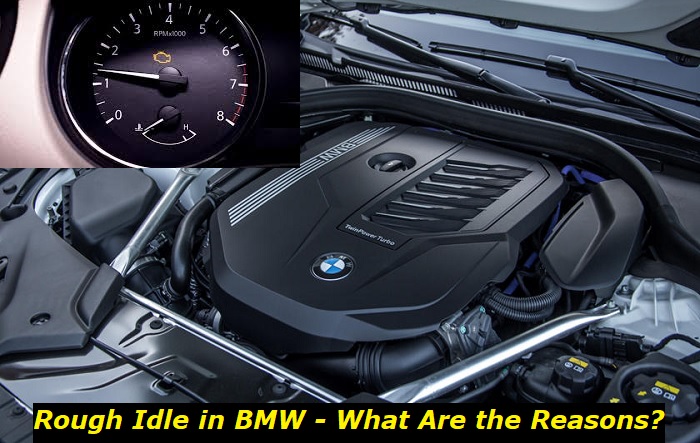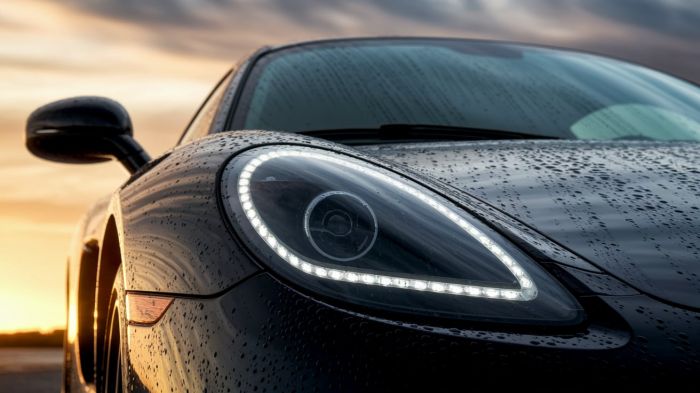For a luxury car, finding it vibrating and creating raspy sounds while trying to idle is both bothersome and frustrating. It could lead to a chain of thoughts: from the hassle of bringing your vehicle for repair to the ceiling-high repair costs.
Engine idling problems highlights
- Level of urgency:Low
- DIY inspection:Possible but may be complicated
- DIY repair:Sometimes, possible
- Cost of repair:$150 - $600
- Can you drive?Yes
- Commonreasons:IAC valve, throttle position sensor, MAF sensor, carb problems, fuel pressure issues, air supply problems
- Ways to fix:Adjusting the system or replacing the faulty sensor or another part thatis diagnosedto be bad

Causes of Rough Idling in BMW
1) Damaged or misaligned engine mounts
Engine mounts hold the entire body of the engine in your car. It composes of metal and rubber. Although, its design helps the engine take minimal absorptions and shocks. It goes bolted in between the frame and the engine block.
Although this rubber protects the engine from vibrations and impacts, it is not shockproof and could also break.
But with constant movement, the engine mount goes through wear and tear. Other than wearing and breaking, the engine mount can also misalign.
The loss of isolation of vibrations from your BMW engine could transfer them into the vehicle's chassis, causing rough idling.
To diagnose this problem, start by checking the mileage of your vehicle. If it's over 100,000 miles, then it's like experiencing aging problems. The best way to check if the problem is in the engine mount is to get under the hood and run your accelerator. Have someone look over if there are excessive movements or shaking. You will find cracks on the engine if it's already blown.
Aside from the excessive movements, a misaligned engine mount produces clunking or rattling noises. If the cause of rough idling comes from a broken or damaged engine mount, you need to contact your technician for replacement. If the problem is a misaligned engine mount, a professional needs to inspect it for damages and perform possible replacements.
2) Bad spark plugs and ignition issues
Ignition is the most crucial process of power generation. It needs proper timing to ignite and generate power. But because of the required time precision and since BMWs are high-performance vehicles, you need your ignition system to work smoothly and ensure that combustion takes place at the right time.
While BMW is not so prone to having faulty spark plugs or ignition issues, many factors affect why spark plugs cause misfires, reduce power, or hard start. Your spark plugs could age and wear out over time. Environmental factors such as temperature can also affect the performance of your ignition system. Other factors that can affect the performance of the ignition systems are poor maintenance and driving habits.
Replace the spark plugs or ignition components affected. You don't have to wait for 100,000. mileage, replace spark plugs every 30,000 to 60,000 miles driven.
3) Clogged fuel injectors
Fuel injectors spray the correct amount of fuel into the combustion chamber to mix with the air and ignite them to produce power. However, when these injectors are clogged, the fuel needed for efficient combustion reduces and causes the engine to sputter as if lacking power.
Clogged fuel injectors can lead to lean or rich fuel mixture, reduced fuel pressure, stalling, and poor fuel economy.
Aside from rough idling, other signs you have clogged fuel injectors are misfires, hard starting, check engine light, and seemingly decreased power or acceleration. Depending on the problem, you can clean clogged fuel injectors or replace them when it is already failing. One single injector with less than 10% restriction can cause misfiring and rough idling in BMWs.
4) Vacuum leaks
According to BMW Repair Guide, vacuum leaks cause about 90% of rough idling issues in BMW. The vacuum system allows and restricts air from getting into the engine. It utilizes sensors to measure this data to throw into the computer so the computer will decide how much air should go into the cylinder heads. However, when there are cracks, some air could flow into the system unmetered, which may cause the engine to sputter or run rough.
Apparently, BMW is prone to measuring the incorrect amount of airflow or fuel when there are vacuum leaks. It has a system that adjusts the air-fuel mixture regularly and continuously. And the system always refers to the data sent by sensors, including the Mass Air Flow Sensor (MAF). However, vacuum leaks do not pass by this sensor. Therefore, the system is unaware that unmetered air flows into the cylinder heads. This event will now cause the engine to run rich or lean.
The best fix in these cases is to find where the leak is coming from. Check the vehicle's throttle body, hoses, connections, solenoids, actuators, and gaskets. These components are the most probable places to find leaks. You may also find them between the Mass Intake Sensor and throttle body vacuum leaks.
5) Defective Mass Airflow Sensor (MAF)
The Mass Airflow Sensor (MAF) measures the airflow entering the intake manifold. It transmits this data into the computer so the computer tells how much air or fuel should get into the chamber. But like any other sensors, they are sensitive and can fail. And if this sensor fails, it will transmit incorrect measurement amounts of air and fuel to the computer.
This sensor can malfunction because of different reasons:
- Dirt and debris
- Exposure to elements like moisture and oil
- Electric problems such as loose connections and short circuits
- Improper installation
Good thing this sensor is easy to replace. Its price starts at around $280 and can go up to $1000.
6) Exhaust manifold leak
Like the intake manifold, the exhaust manifold consists of sensors to determine the amount of air or fuel leaving the engine. The Oxygen sensors also report to the ECU how much oxygen flows in the exhaust system. The engine runs lean when the exhaust system has more Oxygen, while it runs rich when it has less oxygen.
How does it cause rough idling?
If there is a leak in the exhaust system, the Oxygen levels will increase. The leak would flow into the O2 sensor upstream. The sensor will find that there's too much Oxygen in the system. The ECU will respond by adjusting the mixture and making it rich, Although, there is no problem with it. The richening mixture will now damage the spark plugs and cause misfiring, which later causes the engine to run rough.
This event reduces the engine power and causes a somewhat- ticking or hissing sound when there is an exhaust leak. Additionally, you may start smelling exhaust fumes.
Your best way to confirm that your BMW has exhaust leaks is to use a smoke machine. Now, fixing leaks depends on the extent of the damage. You may have to replace, patch, or weld metal components.
Our best recommendation is to get it done professionally by your trusted service shop.
7) Catalytic converter failure
A failing or clogged catalytic converter can cause the engine to run or idle roughly. These components convert exhaust gases into less harmful ones. But because of its job and design, this component is prone to clogging. A clogged catalytic converter restricts airflow, making it difficult for the engine to breathe. This event decreases engine power and causes misfires or hesitation, resulting in the vehicle sputtering or shaking when trying to idle.
The necessary repair for this problem depends on the extent of the damage. You may have to clean it or replace it. Welding metal components such as pipes range from $5 to 200 if you bring them to a muffler shop, while replacement can go as high as $3000.
Symptoms of Rough Idling in BMW
Here are the signs your BMW is running rough:
- Rough Acceleration
- Misfiring
- Poor fuel economy
- Check engine light
If you find these symptoms in your vehicle, find which components are affected. However, finding the cause alone can be a daunting task since there are many possible reasons why rough idling happens. Our best advice to quickly resolve this issue is to seek professional help to get an accurate diagnosis and avoid unnecessary replacements or repairs.
How to Avoid Rough Idling?
The best way to avoid rough idling in your BMW is regular maintenance. Regular maintenance keeps your engine components in check and helps you avoid future performance problems in your engine components.
With regular preventive maintenance, such as changing oil and spark plug replacements, you can have peace of mind that your engine is in good shape and will run smoothly.
Another way to avoid rough idling is to use high-quality and clean fuel. Clean fuel minimizes contamination, dirt build-up, and clogging in the engine. You also need to keep your intake system clean.
With these practices, you can keep your BMW running smoothly and avoid rough idle.
Final Thoughts
BMW is a reliable vehicle to own. It has quality engineering designed for high performance and smooth handling. However, some problems and external factors can affect its performance and cause it to idle or run rough.
In most cases, rough handling happens because of problems in the components of the intake, ignition, and exhaust systems. Also, do not ignore when your BMW flashes the check engine light. Addressing the problem sooner will help you prevent further damage and costly repairs.
About the authors
The CarAraC research team is composed of seasoned auto mechanics and automotive industry professionals, including individuals with advanced degrees and certifications in their field. Our team members boast prestigious credentials, reflecting their extensive knowledge and skills. These qualifications include: IMI: Institute of the Motor Industry, ASE-Certified Master Automobile Technicians; Coventry University, Graduate of MA in Automotive Journalism; Politecnico di Torino, Italy, MS Automotive Engineering; Ss. Cyril and Methodius University in Skopje, Mechanical University in Skopje; TOC Automotive College; DHA Suffa University, Department of Mechanical Engineering






Add comment